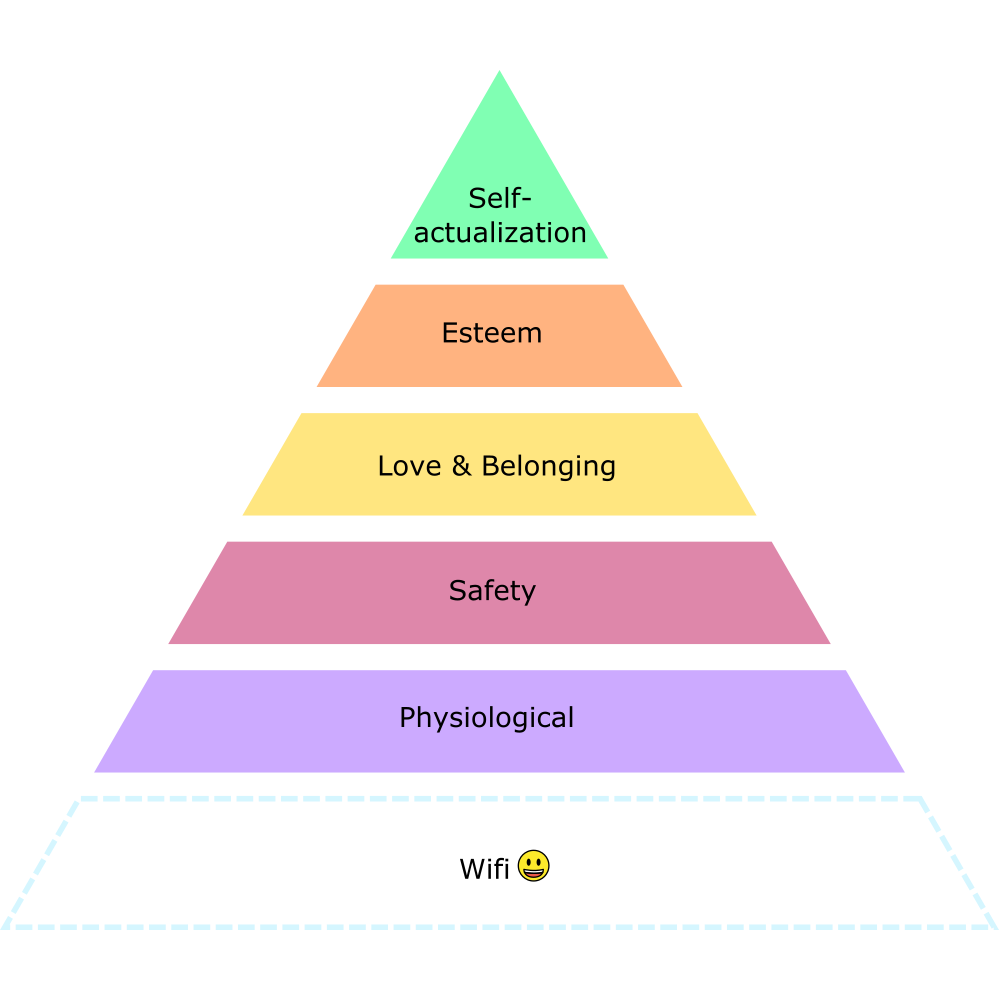This post first appeared on the 1st things 1st blog.
Somewhat 80 years ago, an American psychologist Abraham Harold Maslow generalized a hierarchy of needs, where each level of needs builds upon the previous one. At the very base, people require a smartphone with the Internet. Just kidding.

The overview of Maslow’s hierarchy of needs
At the very base, we all have physiological needs. To stay alive, we need to eat when we have hunger, drink when we are thirsty, have something to wear for the right body temperature, get to the WC when we need it, have a place to sleep, and probably someone to sleep with.
Then we have safety needs, such as a stable source of income, having where to live, being secure outside, at home, and at work, having some rules to follow, being treated well in case of illnesses, and getting help in case of fire or other catastrophes. At this level, we want to have structure and order. We want to know our limits and live stable and predictable lives.
These two steps ensure that a person will survive physically in this world.
Then we have a need to love, be loved, and belong. At this level, life without connections feels empty. We require pets, friends, lovers, family, coworkers, communities. We want to be a part of something bigger. We want to share intimacy and tenderness, affection and belonging.
The next level is the need of esteem. We want to feel strength, self-esteem, and self-love inside of us. At the same time, we want recognition for our achieved mastery and respect for our competence from the outside world. At this level, we demand reputation and prestige.
Then there is the need of self-actualization. At this level, we want to explore, learn more, stimulate our minds. We want to play, grow, bring our best to the world. We need to be in harmony, order, and beauty.
The needs and priorities
At all of those levels we make decisions.
- At the bottom of the hierarchy we need to choose what to do to survive physically.
- Then we need to make decisions what to do to survive psychologically without becoming robots or zombies.
- Then we need to decide what to do to become more than social animals.
- Then we need to find a way how to escape the narcissism and arrogance.
- Finally we need to make decisions what to do to achieve the full harmony in the world.
To make conscious decisions we have to prioritize some things over others. Let’s explore some of the crucial decisions we make at each level of our needs.
Physiological needs
What are you going to eat and drink to survive another month, week, or even this day?
When choosing food and drinks, you would typically ask yourself: Is your food cheap? Does it fill you? Is it tasty?
To get to the upper levels, you should also ask: Is your food healthy? Is your food nutritious? Does it give enough energy to you? Will your friends or family like it? Will you get a compliment for making this dish? Will your cooking skills be honored? Is it made from the best ingredients? Won’t you need to throw half your ingredients away? Is your food supply chain practical, ethical, fairtrade?
What are you going to wear?
When choosing clothes and shoes, you would typically ask yourself: Do they fit the season? Are they clean? Do they look appropriate?
To get to higher levels, you should also ask: Are they comfortable? Do they look good? Will your friends and loved ones like it? Do you feel like yourself in those clothes? Do you look respectful with this outfit? Do you need another piece of jacket this year? Are you living your authentic self with these clothes?
Safety needs
What job should you have?
When choosing a career, you would typically ask yourself: Is it paid enough? Do you understand, and can you do what they ask you there? Is it not too hard? Is it not too boring?
To get to the upper levels, you should also ask: Do you feel accepted by coworkers? Are coworkers friendly? Are you recognized for your work? Does your salary match your skills? Does the work fulfill you? Do you grow enough there? Do you do something meaningful there? Are you living your full potential at your work?
What should you buy today?
When choosing a purchase, you would typically ask yourself: Is it affordable? Do you want it? Do you need it?
To get to the higher levels, you should also ask: Is it long-lasting? Will that improve your comfort? Will that improve your relationships? Is that a brand you like? Will that look prestigious? Will that represent the status you are at? Is it useful? Does it look authentic and original? Is it ethically and ecologically made and brought to your shops?
Love & belonging needs
Which event should you attend?
When choosing events to go to, you would typically ask yourself: Would you go to this event for solidarity? Do you like the content of the event? Do you like the people who will gather there? Is it a chance to make new friends?
To get to the upper levels, you should also ask: do you feel like yourself in these kinds of events? Is it a chance to express yourself and gain recognition there? Is it not too long? Is there a chance to meet people of the same interests and social status? Can you make an impact at such events? Can you feel authentic at such events?
What present to get to your friend?
When choosing a present, you would typically ask yourself: Can you afford it? Will your friend like it? Is it something they don’t have yet?
To get to the higher levels, you should also ask: Will that present match your friend’s social status? Will that gift show your admiration and respect for your friend? Will that present lift your friend? Will that present add up to the authenticity of your friend?
Esteem needs
What should be your goals for the upcoming years?
When choosing long-term goals, you would typically ask yourself: Is that goal specific? Can it be measured? Is it attainable for you? Is it realistic to achieve it? Is the timing correct for this goal?
To get to the upper level, you should also ask: Is the goal positively stated? Is it ethical? Is it challenging you? Is it environmentally sound?
What books should you read?
When choosing your next book to read, you would typically ask yourself: Does it bring you knowledge and understanding? Does it improve your skills? Is it widespread or reputable literature? Is it interesting? Is it entertaining?
To get to the higher level, you should also ask: Does it make you a better human being? Does it lift you up spiritually? Does it help to find yourself or going towards your personal mission?
Need for self-actualization
What are the activities that you could call your Ikigai?
When choosing your reason for being, you would typically ask yourself: Do you love doing it? Are you good at it? Can you be paid for it? Does the world need it?
To go even further, you should ask yourself: Is it healthy? Is it ethical? Is it sustainable? Is it ecological? Is it progressive?
What should you do today?
When choosing the next optimal action to do today, you would typically ask yourself: Does that bring you closer to your goals? Does it remove bottlenecks? Does it make money or reduce costs?
To go even further, you should ask yourself: Is it impactful? Is it ethically, socially, and ecologically responsible? Does it bring more health and clarity to your life?
Invitation
So you have to make decisions and prioritize your choices at all levels of needs. The strategic prioritizer “1st things 1st” was designed to help you not lose yourself among all those choices and dimensions and help you grow as an individual, personality, and spirit. You are invited to use it and make your life more progressive.
If you are still struggling at the survival phase, but you would still like to make better decisions in your life, drop me a message and your reasons at the contact form. Every month I will select several people to use the tool for free.
Cover picture by Chester Wade


